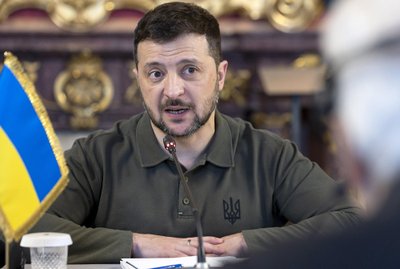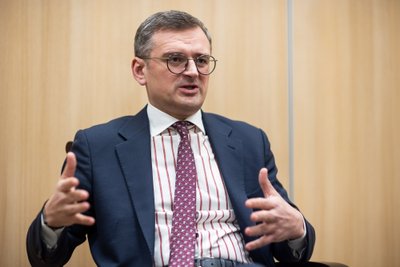Russian economist and former economic advisor to President Vladimir Putin, Andrei Illarionov, has been a vocal critic of Putin’s administration since 2005. After leaving Russia, Illarionov has worked with various think tanks and participated in political discussions. He has also publicly criticized former U.S. President Joe Biden and his policies. Currently, Illarionov is affiliated with the Center for Security Policy (CSP), serving as a senior analyst on Russian and European affairs.
– Recently, your interviews often begin with you explaining to the interviewer why Trump is better than Obama or Biden. However, over the past week, Western, Ukrainian, and local media have published numerous stories speculating on the worst-case scenarios that could unfold during Trump’s four-year term. Let’s start with that: What do you think is the worst-case scenario for the Baltic states and Ukraine over the next four years?
– I would say the worst-case scenario is what media outlets describe, depending on their perspective—not what Trump does, but what has been discussed throughout this time. And the question arises: To what extent does any of it align with reality? How can we know? By comparing what was said about Trump before and examining how many of those predictions, assessments, and descriptions actually came true.
For instance, Putin—who’s agent, according to them, is Trump—did not conduct any military invasions during Trump’s previous term, not in Ukraine or anywhere else. Meanwhile, under the ’non-agents’ Obama and Biden, Putin acted towards neighboring and even distant countries, pardon the expression, like at a buffet where everything is free to take.
They also said the United States would leave NATO, that Trump didn’t support NATO, insulted U.S. allies, and so on. But let’s look at what happened to NATO during Trump’s four years. Under Obama’s eight-year presidency, NATO defense spending declined by $90 billion. During Trump’s term, NATO countries increased their defense spending by nearly $60 billion, and the United States itself increased its spending by another $50 billion. Under Biden—the ’anti-Trump’ and ’not Putin’s agent,’ who is supposedly Putin’s uncompromising adversary—the United States reduced its defense spending from 3.5% to 3.1% of GDP. It is unprecedented for the leading Western power to decrease defense spending while facing Europe’s largest war.
And how was this made possible? I mentioned that President Biden is supposedly an adversary of Putin and fighting him, among other things, through sanctions. However, during these so-called sanctions, Putin gained an additional $800 billion in revenue from the sale of Russian resources. This allowed Putin to expand his military-industrial complex, increase defense spending, wage a brutal war against Ukraine, crush political opponents within Russia, and carry out sabotage operations in other countries worldwide, including Europe, Estonia, and the Baltic states. When the so-called "Putin’s agent," Trump, was president, none of these things happened.

– Russian officials did not respond to Trump’s inauguration with much enthusiasm. For instance, Viktor Sobolev, a retired general and member of the State Duma, said that the situation for Russia would only worsen. You also mention that Trump could be significantly tougher on Russia than Biden. What does that mean, and how could this toughness manifest?
– There should be no exaggerations or misjudgments here. Yes, Trump genuinely wants to make a deal. About what? About Putin stopping the war in Ukraine. He truly desires this, offering and insisting that Putin cease hostilities. However, if Putin refuses, the big question arises: what happens next? What Trump would do if Putin doesn’t agree to end the war is something no one knows right now.
What Trump has said and continues to say is only the first part of his plan. He believes it’s better to resolve the issue through soft measures rather than forceful ones. He has already stated this. What exactly he means by ’forceful’ remains unclear. He has referred to his threats and pressures on Putin during his first term. Currently, those measures are likely less effective, perhaps even ineffective, given Putin’s initial behavior.
But Trump sees and understands this as well. This brings us rapidly to the moment when Trump’s willingness to end the war through soft, diplomatic methods, combined with Putin’s reluctance to comply, will become evident and clear to everyone. At that point, the critical question in this conflict will arise: what happens next?
There are two possibilities. Either Trump accepts that Putin refuses to meet his demands, or Putin continues the war, forcing Trump to respond. I doubt that in a scenario where the stakes are raised—and Trump is the one to raise them—he would simply accept Putin’s dishonorable refusal. Everything we know about Trump suggests that he would not passively accept Putin’s decision to keep the war in Ukraine going. This means that Trump would act. But how he would act remains to be seen.

– You are highly respected in Ukraine and frequently provide commentary for Ukrainian media. I’d like to ask about Ukraine. What would you advise our Ukrainian friends? Considering the current situation, should they forget about the 1991 borders, or could a Trump administration offer new opportunities for Ukrainians?
– I would recommend to Ukrainians what I have always advised them—not just over the past three years, but over the previous eight years as well—11 years in total during which Putin has been waging war against Ukraine. History has taught us how it is possible to stop Russian leaders who pursue imperialist policies.
This conclusion and lesson apply to Ukraine, Poland, Finland, Estonia, and any other country that has fallen victim to the aggression of the Russian Empire. The only way to stop Russia is to achieve a military victory over it.
This may sound strange or shocking, but over the past three centuries—regardless of the political regime in Russia, whether it was the classical authoritarian imperial regime, the totalitarian communist regime, or today’s Putin’s Russia—aggression has only been stopped through military force. If necessary, this must be done multiple times. If necessary, three times.
Unfortunately, it is only through immense sacrifice and bloodshed that the empire’s aggression can be halted against Finland, Poland, and other countries—provided that these nations act together.
We also see how Israel manages to resist aggression, being forced to conduct defensive operations every 8, 10, or 12 years. Yet, it is precisely through these efforts that Israel ensures the survival and security of its state and people. This is a lesson for all of Russia’s neighbors.

– I began with the darkest and worst-case scenario. Don’t you fear that the worst-case scenario in this instance might be that Donald Trump and his administration become so preoccupied with internal battles in America that it diverts their attention from more critical issues, including the Middle East and Ukraine?
– You are absolutely right. Such a risk does indeed exist. What Trump has initiated in the United States is remarkable. On his very first day, he issued about 200 directives, followed by new regulations and decisions on the second day. Recently, an extraordinary order was published that reverses previous decisions made by Biden and Obama. This is comparable to the perestroika during the final days of the Soviet Union.
Right now, a battle is being fought on all fronts: primarily ideological and foreign policy fronts within the U.S. Whether Trump and his team will have the strength, time, and resources to not only fight on these fronts but also to win remains uncertain. However, this is a revolution. And this revolutionary war, in which success is not guaranteed, draws attention, support, and resources from freedom advocates across the globe.
– You say that Trump has launched a revolution. Do he and his supporters understand that if he truly wants to carry out a revolution and combat leftist ideas and ideological systems, he must confront the humanities and social sciences departments at universities? These are the strongholds and bastions of such ideas, where their proponents have been reproduced over the last half-century.
Through directives like those recently issued by Trump, and undoubtedly others that will follow in the near future, it is possible to begin addressing this issue. However, if the goal is not only to bring about change and lead a revolution but also to secure its outcomes, there is no other path.
The primary arena of ideological struggle will become the education system—universities, schools, and the entire education infrastructure. I won’t hide the fact that I have recently submitted my proposals and views to the Trump administration on this matter, including suggestions for reforming the education system.

– I know that when asked what you would advise the Ukrainian authorities or how you would comment on their actions, you are always very reserved. But what would you recommend to our politicians? How should they act during Trump’s presidency?
I recommend everyone watch that interview because it is a brilliant example. With great respect, precision, and unmatched Baltic style, Hans interviewed the former Ukrainian minister and demonstrated that he, as an Estonian journalist living in Tallinn, knows a great deal about Ukraine, its foreign policy, and the situation on the frontlines.
During the interview, Hans not only detailed the developments of the Lend-Lease program—its results, conditions, and payment deadlines—but it also became evident that Kuleba, Ukraine’s former foreign minister of a nation at war, knew nothing about it. Kuleba was unaware not only of the law passed in the U.S. and its terms but also of who supported or opposed it and when the payments were due. These details are publicly available from the U.S. Congress. Yet Hans, an Estonian citizen and journalist living in Tallinn, who follows events closely but is not directly involved in them, knew all of this perfectly well.
Estonia has indeed made a significant contribution to Ukraine’s defense and the security of the entire Western world. Unfortunately, we see that there are serious problems on the side of the Ukrainian authorities. Some of these I have already mentioned. Additionally, I recently highlighted that data regarding the funds used to defend Ukraine in 2024 was misrepresented.
This occurred during a press conference with British Prime Minister Keir Starmer during his visit to Kyiv. The very next day, I had to publish the actual data on Ukraine’s expenditures because it turned out that the Ukrainian president had presented inaccurate figures.

– Did he do it knowingly?
– There are different aspects to this. Zelensky has exaggerated the contributions of allies and partners while underestimating Ukraine’s own efforts. It is difficult for me to imagine any logical reasoning behind why an economic leader or someone responsible for the country’s defense would want to overstate the contributions of partners. Normal logic would suggest the opposite. The same applies to the total amount of military aid Ukraine has received over the past three years. The figures mentioned by the Ukrainian president do not correspond to reality.
Since the spring of 2022, I have been trying to publish accurate data on U.S. military aid in Ukrainian media. However, without exception, all Ukrainian outlets have refused to do so. They preferred to publish false and fabricated data, which initially exaggerated reality tenfold, and in some cases even more.
These figures distorted reality and reduced the chances of addressing the situation, both in its early stages and later. To this day, no Ukrainian media outlet has published the actual figures, despite them being available in English, Russian, Estonian, and other languages. The only exception is Ukraine itself, where the truth has not been disclosed.
Former Foreign Minister Kuleba and other officials are also aware of this. However, Ukrainian authorities have done nothing to address the situation, provide reliable information, or even respond to U.S. demands. In other words, Ukraine’s political leadership prefers a situation where both Ukrainian society and they themselves remain deceived by lies that, in reality, work against Ukraine.
– How can Estonia make itself "interesting" for the new administration? How should our politicians interact with Trump? What are your recommendations?
– You’ve asked a complex question.
– If our prime minister were to come to me and ask: ’Please tell me, you are experienced, you know what’s happening in Washington, you understand Trump’s people—what advice would you give? How should we act, how should we be?’
– You know, I think there are things that modern Estonia is certainly not doing worse than others and may, in fact, be doing much better. Naturally, I don’t know everything that happens in Estonia, but what is public and has been done publicly gives me the impression that Estonia has the most serious, balanced, and accurate understanding of the aggressor.
I haven’t seen or received from any intelligence agency, including the CIA, a more precise assessment of the aggressor’s economy and military-industrial complex than those provided to the public by Estonia’s intelligence during the Ukrainian war.
Estonia and the Baltic states present their perspectives to the world in both Russian and English—languages that the entire world understands. For example, Delfi has made it possible to familiarize oneself not only with Boris Johnson’s views but also with a fantastic interview with Dmytro Kuleba, aimed at a global audience, where the interviewer asks very precise questions.
There have been hundreds, even thousands, of interviews with both Johnson and Kuleba, but Delfi’s interviews are absolute masterpieces. I recommend everyone watch them to better understand what is happening in the world. These interviews also demonstrate that Estonia often has a much better understanding of the situation than Western countries or even Ukraine itself.
